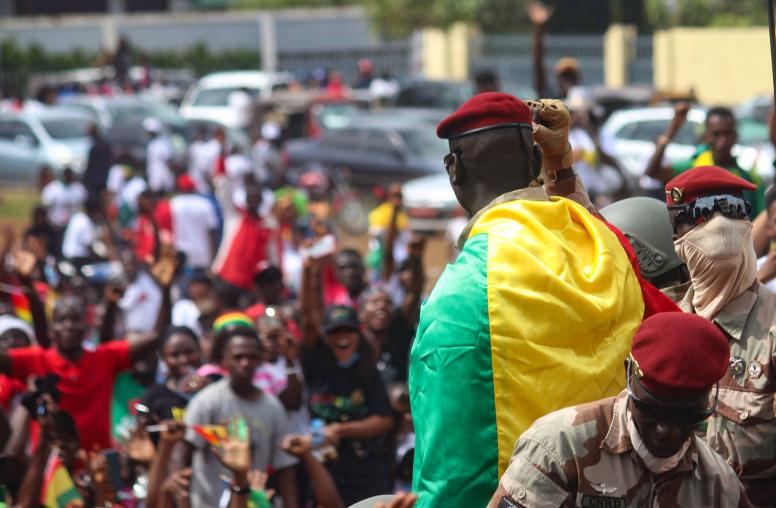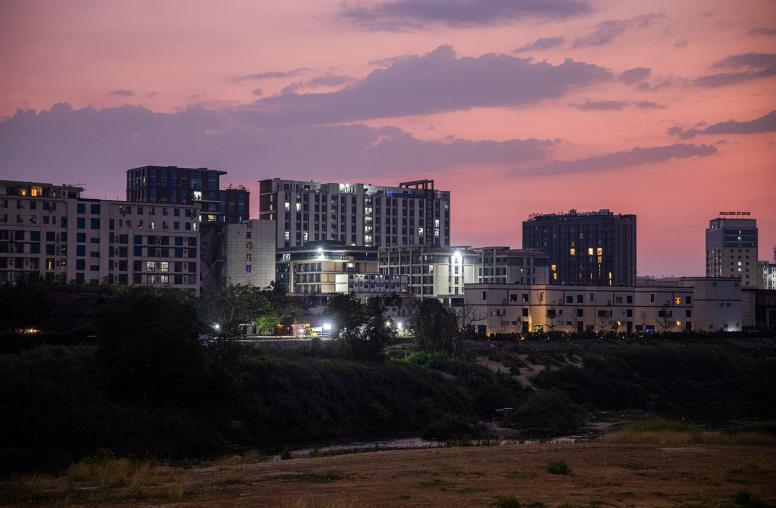Countering Coups: In Africa, Use Investment to Build Rule of Law
America and its partners should ‘flip the script’ of past pro-democracy efforts.
Policymakers are urgently seeking ways to reverse the erosion of democracy in fragile states exemplified by the past year’s surge in military coups in and around Africa’s Sahel region. To halt this decline, it’s vital to listen to African voices urging that international partners make the most of a powerful pro-democracy tool: increased foreign investment built upon the rule of law.

Various U.S.-based analysts have pinpointed critical steps by governments and institutions to prevent armed coups, such as the five in Africa this past year. Among their recommendations:
- Make democracy a greater priority, with a more consistent, coordinated strategy and programs. A key U.S. step is to aggressively implement the Global Fragility Act and the strategy it has mandated, which targets several African countries.
- Buttress the pro-democracy mechanisms of regional groupings such as the Economic Community of West African states and African Union — both in preventing coups and in responding when they take place.
- Build better transitions to democracy when coups occur, through inclusive national dialogues that can shape local pro-democracy reforms, clarify the role of the military, and help civilian governments better meet the needs of their people. Also, lend greater support to civil society in countries at risk of coups.
These approaches focus on strengthening commonly recognized elements of democracy: civilian control of the military, inclusion of minorities and disfavored groups, government accountability enforced by vibrant civil society, and others.
Investment: A Heavy Pro-Democracy Tool
African analysts and leaders meanwhile are apt to point out the significant pro-democracy impact that can be achieved by expanding private sector investment designed to boost broad economic growth. The United States and its partners can harness what might be called a “pro-democracy multiplier effect” by working with pro-democracy constituencies in Africa to build the enabling environment needed to attract investment. This includes bolstering the rule of law and stable regulatory frameworks that can reduce corruption, ensure effective legal recourse for international and local investors and protect citizens’ rights.
The outsized benefit of this improved governance is indicated in a study by business services firm PricewaterhouseCoopers, which tracked the economic gains enjoyed by African countries that improved their public governance from 2013 to 2017. It estimated that “if each African economy made an improvement to governance equivalent to that made by the strongest performer, Côte d’Ivoire,” the continent’s overall gross domestic product would grow by about $23 billion. Of course, improved governance and positive economic growth does not guarantee democratic progress — Guinea’s economy had been growing for several years, the study noted, when it suffered a coup — but weak rule of law and economic despair is almost guaranteed to undermine democracy.
As vital as that economic argument was before COVID, it is only more so now. The pandemic has suppressed economic growth in many countries in Africa, pushed millions of people across the continent into poverty, and set back their basic development efforts. Alongside the pandemic’s continued burden, the Russian invasion of Ukraine is spurring inflation, with potentially devastating socio-economic impacts on countries in Africa.
Youth Despair + Ineffective Governance = Toxic Mix
Why would the democratic boost from establishing basic rule of law and generating economic growth be so powerful? The reason is in the volatile mix of problems that has been erupting not only in the form of armed coups d’état, but in their close cousin: violent extremist movements. These democratic erosions in Africa are fueled largely by fragile states’ deep inabilities to provide their increasingly young populations with education and employment pathways on which they can build livelihoods. The lack of jobs breeds despair, particularly among African youth.
Besides deterring foreign investment and harming economies, the lack of respect for the rule of law creates an environment for systemic human rights abuses, another destroyer of governments’ legitimacy in the eyes of its citizens. Thus trapped, desperate youth fall prey to the false promises — by religious or populist extremists, or criminal networks — that they can win justice and future prosperity with guns. It is the simmering anger of these youth that tempts soldiers to make the putschist’s bet — that they can seize power in the morning and win the cheers of a crowd in the public square by afternoon.
This toxic mix of youth despair and ineffective governance breeds insecurity that suppresses private investment and economic development, completing a vicious cycle.
Flipping the Script
African voices are the first to tell us that this starting point — creating the conditions for investment driven by respect for the rule of law that protects both businesses and citizens’ rights and livelihoods — resonates powerfully on the continent. African leaders, while perhaps not as aware of their investment climate shortcomings, often call for greater African trade and investment with the United States and other nations. The long dialogue between African countries and their would-be “democratizers” abroad typically has focused on what changes those external powers want to prescribe. The focus on foreign investment flips this script so that the starting point is what African countries are telling the world they need.
If the United States and its allies can lead their pro-democracy effort by offering partnership in encouraging investment and the rule of law, then democratization and reformed governance — including transparency, human rights, unfettered media, independent judiciaries — become more clearly the instruments of Africans’ own ambitions, rather than exports from Europe or the United States.
Foreign investors are rightly concerned about the security of their investments. The rule of law in many African countries is weak, putting many investments at high risk. As with other parts of the developing world, too often corruption and cronyism undermine the foreign investment that African economies so badly need. Because “investment is a coward,” Africa has only some 3 percent of the world’s foreign direct investment, despite having some 16 percent of the world’s population. Africa’s marginalization from the world economy is not because of the lack of good investment opportunities. It’s because of poor enabling climates.
For the United States, the 2018 law that expanded the U.S. International Development Finance Corporation (DFC) provides a more powerful means of reducing investment risks. The corporation offers foreign investors political risk insurance and favorable loans to enter African markets. This government-backed investment creates jobs and can strengthen the local business and political constituencies that have an interest in building the rule of law that is so essential to democracy. In the last year, DFC has provided a $37 million loan guarantee aimed at job creation through small enterprises in Burkina Faso, Sierra Leone, Guinea and Mali, and a $20 million loan to a bank in Liberia to increase access to capital for entrepreneurs. While DFC is primarily a development tool, and strengthening the rule of law through foreign investment is a decades-long effort, its power in bolstering democracy should not be ignored.
Not every foreign investment will strengthen the rule of law. There are corrupt investors — many backed by authoritarian state-owned institutions — who willingly undermine it. But on balance, foreign investment, especially by the United States, honors and strengthens the rule of law. It is essential to promoting the economic growth that bolsters fragile states.
Post-Coup Transitions: A Long Game
The United States and other governments typically have responded to coups in Africa by pressing for a rapid return to elected governments — without any real effort to correct the weaknesses that produced the coups. Too often fundamental problems are left unresolved, including economic despair, setting the stage for the next coup or insurgency. While economic growth isn’t everything, poor economic conditions are a big driver of coups, and the rule of law that makes it possible can deter potential coup makers.
Combatting coups and bolstering fragile democratic governments in Africa, or anywhere, is a challenging mission. It is important to continue using traditional tools and addressing traditional priorities. But new areas of focus are needed too, especially economic development, which speaks to the needs and desires that Africans express.
The tragic surge in coups creates a challenge to build with Africans a set of locally shaped transitions to truly durable civilian rule — with internationally encouraged private investment as a key element. This is a long game for sure, but there are no shortcuts to democracy, which greatly struggles without a growing economy. Without foreign investment and the rule of law, the trending scourge of military rule may well be difficult to counter.



